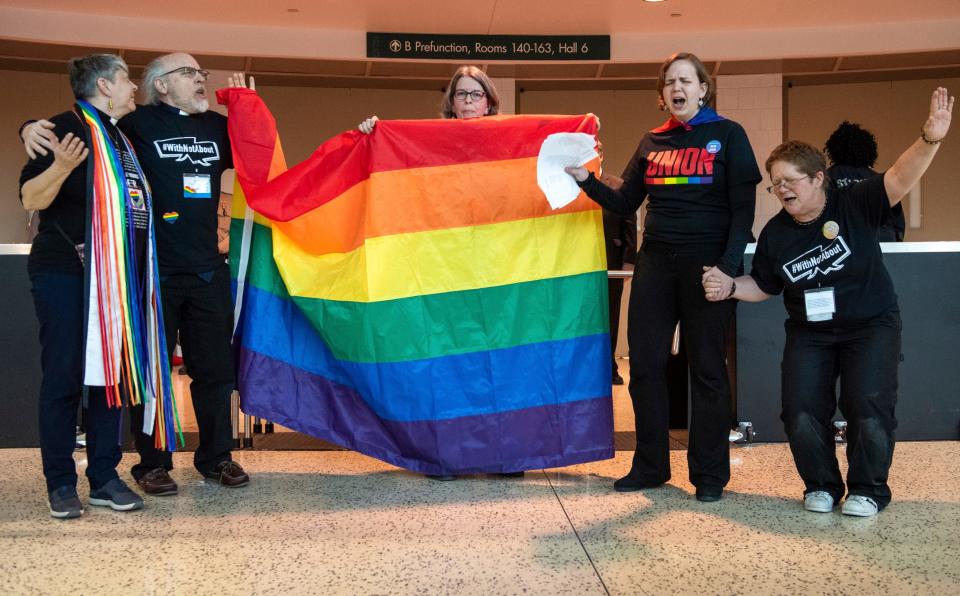A new Methodist denomination announced its official launch. How did we get here?
A new Methodist denomination's recent announcement of its official launch as a more conservative alternative to the United Methodist Church was attention-grabbing news.
But the new denomination has been years in the making.
The Global Methodist Church said it will officially launch on May 1, putting into reality an event that Methodists have been anticipating for three years as part of a six-year-long debate over LGBTQ rights.
Still, a lot remains in flux. The Global Methodist Church's announcement followed a decision to yet again postpone the UMC General Conference until 2024, when delegates are expected to vote on a plan for a new denomination.
That plan still requires approval. As a result, the Global Methodist Church will be on its own, instead of receiving certain assurances outlined in the plan for at least two years.
So, how did we get here and what happens next?
New denomination announces launch: New denomination announces May launch as United Methodist Church inches toward split over LGBTQ rights
Commission weighs postponing conference: United Methodist leaders weigh postponing conference where vote on split is expected
Is there an official start date of the debate, and why did it start?
United Methodists have long debated LGBTQ rights in the church, including the ordination of LGBTQ clergy and a clergy's authority to marry same-sex couples, for example.
The debate reached an inflection point in 2016 after hundreds of United Methodist clergy came out as gay and when a regional conference elected the first openly lesbian bishop. The 2016 General Conference — a body of hundreds to thousands of United Methodist delegates from around the world who gather every four years to vote on denomination policy — approved a commission to review UMC policies on sexuality.
After, a conservative advocacy group called the Wesleyan Covenant Association, which United Methodist churches could become members of, formed to push for stricter policies on sexuality.
How did a policy review become a call for a new denomination?
After the commission reviewed policies on sexuality and issued a report, delegates gathered for a special session of the General Conference in February 2019 to vote on proposals for policies on sexuality.
Ultimately, delegates approved a proposal that did not fundamentally change the denomination's stance on sexuality, which continues to say "the practice of homosexuality is incompatible with Christian teaching." However, traditionalists felt the issues were still unresolved.
"Many believe a parting of ways is the only viable way forward," the Wesleyan Covenant Association said in a news release after the 2019 special session.
Also, the General Conference approved an "exit plan" at the 2019 special session that allows churches to disaffiliate from the UMC for stances on sexuality.

What is the Protocol of Reconciliation and Grace through Separation?
After the 2019 special session United Methodist leaders, from more progressive to more conservative — also called "traditionalists" — gathered to draft an agreeable plan for traditionalists to leave the UMC and start their own denomination. That plan is called the "Protocol of Reconciliation and Grace through Separation."
The protocol says the new traditionalist denomination will receive $25 million from the UMC to get started. It also allows churches that disaffiliate from the UMC and join the new denomination to retain their assets because UMC churches typically don't own their property, the regional governing body does.
Delegates were expected to vote on the protocol at the regularly scheduled General Conference in 2020.
But the 2020 General Conference was postponed, so what happened?
Due to COVID-19, the 2020 General Conference was postponed. Twice, actually. Its newest date had been Aug. 29-Sept. 6. In the two years since the conference's originally scheduled date, and because delegates have not voted on the protocol, at least 132 churches have already disaffiliated from the UMC, according to the United Methodist news service.
General Conference postponed yet again: United Methodist Church's General Conference rescheduled for late summer 2021
The Wesleyan Covenant Association announced last year it would establish the new denomination and call it the Global Methodist Church.
Weeks ago, the Wesleyan Covenant Association urged churches wanting to disaffiliate from the UMC to wait for the General Conference and a vote on the protocol. Some churches that have preemptively disaffiliated have dealt with legal hurdles, the association explained.
How have the different sides of the debate reacted to the recent news?
The Global Methodist Church, in its March 3 announcement of its forthcoming launch, expressed dissatisfaction with the decision to postpone the General Conference until 2024.
A commission that makes decision about the General Conference made its decision because international delegates continue to face legal constraints due to COVID-19 travel restrictions and visa issues.
Contrary to the Wesleyan Covenant Association's advice weeks earlier, the Global Methodist Church explained it will preemptively launch "so those (churches) who can leave early will have a place to land, to begin building and growing, and making room for others to join later," a news release said.
Meanwhile, Reconciling Ministries Network, the main advocacy organization for LGBTQ United Methodists, said it supports the decision to postpone the General Conference until 2024.
The group said in a news release on March 3 it "will continue in the work of transformation and support for LGBTQ+ families throughout The United Methodist Church and in separating groups including the Global Methodist Church."
Liam Adams covers religion for The Tennessean. Reach him at ladams@tennessean.com or on Twitter @liamsadams.
This article originally appeared on Nashville Tennessean: Global Methodist Church launch: What to know

